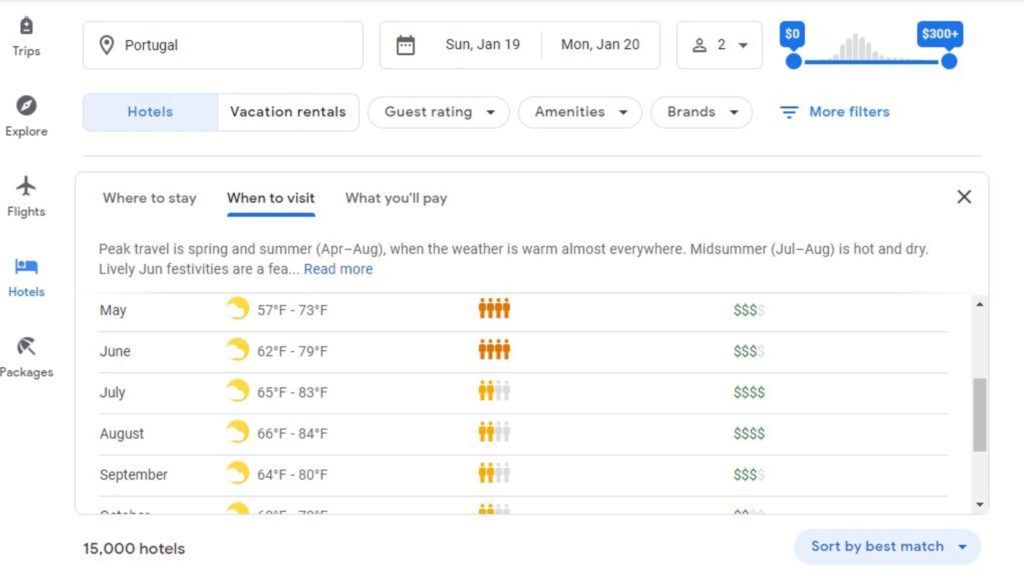
Leave it up to Google to re-invent the world of travel on more time. Just as most of us were recovering from all the New Year’s parties and celebrations, Google has also joined the party by launching their new and improved Google Travel platform.
To add some historical context to this announcement, it is well documented that Google has been making tweaks and changes to its travel platform since it debuted around 2011 when the company purchased travel-industry software to launch Google Flights. A few years later, the platform became Google Trips which included a new host of travel features. Just last year, I wrote about Google Hotels becoming a new standard in hotel bookings. Later last year, in August 2019, Google phased out Google Trips as it decided to merge all travel services with other products including Google Maps.
The newly launched Google Travel site adds new features such us helping travelers find the best timing for their trips, best places to stay as well as how much they can expect to pay. In other words, the new platform, streamlines your trip planning needs by consolidating the prior Google Flights, Google Hotels and all other features into a single platform… and Online Travel Agencies are not too happy about it.

Google Travel – New User Experience. Photo by Google.
For travelers that already use a variety of Google products (read: all of us) including their Search engine, Gmail, Google Calendar, Google Maps, Google Docs, etc. the new Google Travel will keep all of your research and trips in one place. How’s that for customer data?
Think about the last time you booked a trip. How many times you searched for potential locations on Google, used maps to highlight places, hotels, flights, etc. All that information, can now be fed automatically to your personal Trips page when you’re signed in to your Google account. Whether you find this sort of “personalized experience” helpful or intrusive is up for interpretation. But of course, Google also offers you an option to opt out of this type of cross-platform tracking if you prefer to keep your history clean.
But again, what might be useful for the traveler, may not be so welcome by the rest of the travel industry that it’s already fighting a constant state of disruption from different fronts.
I particularly like the way Robert Cole, founder and CEO of Rock Cheetah, a travel technology consulting firm describes the typical industry reaction.
“The hospitality industry has a patented four-step method to deal with disruption,” says Cole. “Step one is to ignore it. Step two is that when it’s pointed out to them, they continue to ignore it. Step three is they panic, and step four is they complain about it.”
In case you missed it, Google Maps is now the he No. 1 navigation app with over one billion downloads. What that means is that a lot of us already “trust” Google to tell us what’s the fastest route to get from point A to point B, or from home to work, or what attractions, shops, parking locations, restaurants, spas, etc. are near us at anytime from any location that we enter. Add to that Google’s AI and machine learning capabilities, and you will understand why many times you learn about any type of event affecting your commute or your trip from Google first instead of from your travel agent or airline.
In simple terms, Google is simplifying the decision making process for all travelers by consolidating all potential travel information into a single platform while decluttering repetitive the information already being supplied by all the OTAs.
Does Google have an unfair advantage? It depends on whom you ask. After all, Google is already the dominant search engine in the US and as such, it controls what results appear at the top of all search queries when it comes to travel. It’s no surprise that Google’s own travel platform always appears at the top for all hotel, flights or travel related searches.
However, Google also sends large amounts of traffic to OTAs just as it sends traffic to hotels direct booking options. OTAs also spend billions of dollars advertising on Google and that’s not something that Google is willing to give up anytime soon. So there’s a co-dependency that makes this love-hate relationship more complicated each time Google comes up with new features.
If I were to guess, I would say that hotels are the ones to benefiting more from this situation. Google claims that its own goal is to provide a more level playing field among all parties bidding for travel terms, and that can just help hotels compete better with the ever dominant OTAs. Google will continue to bring a lot of traffic directly to hotels. It’s just a matter of which hotels capitalize on this traffic and are able to have more guests book direct by being able to provide them with a seamless and frictionless user experience. Otherwise, those potential guests will just get frustrated and leave the hotel website to complete their booking at an OTA website instead. Time will tell.
As always, if you need any assistance with your digital marketing, our MGR Team will be happy to chat with you one-on-one. Use this link to contact us and set up your free consultation.
Thank you for reading. Until next time, this is Manuel Gil del Real (MGR).
Photo by Andrew Ruiz on Unsplash




